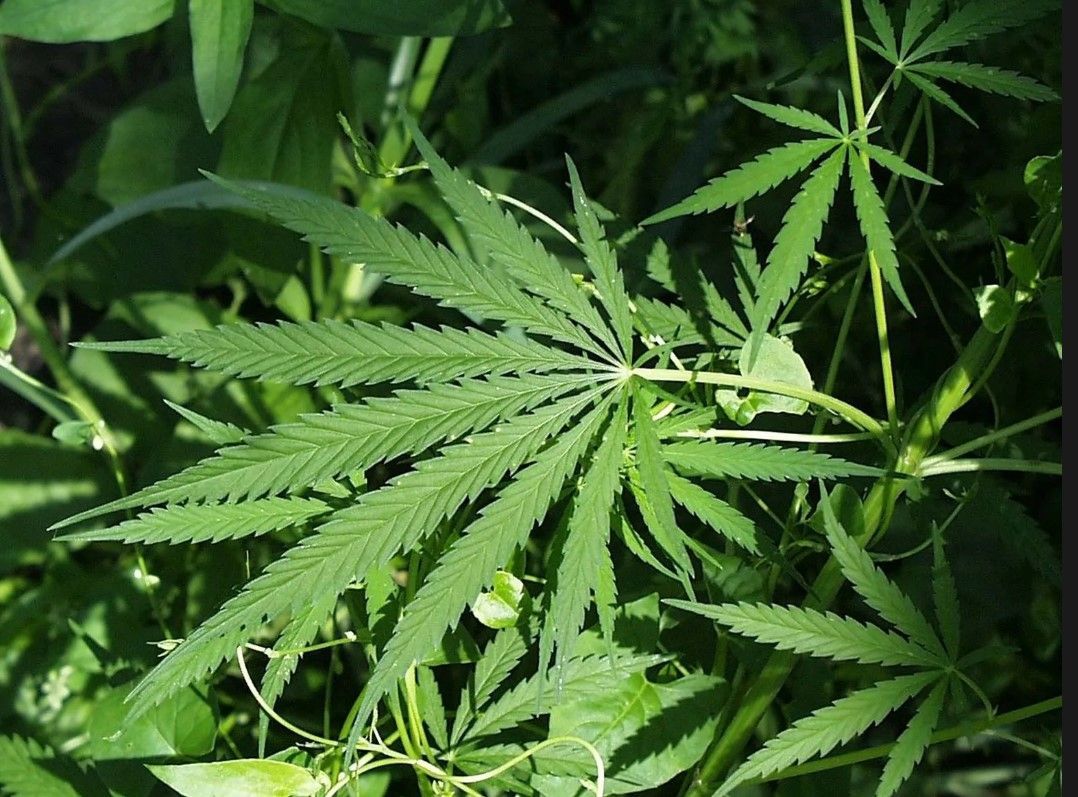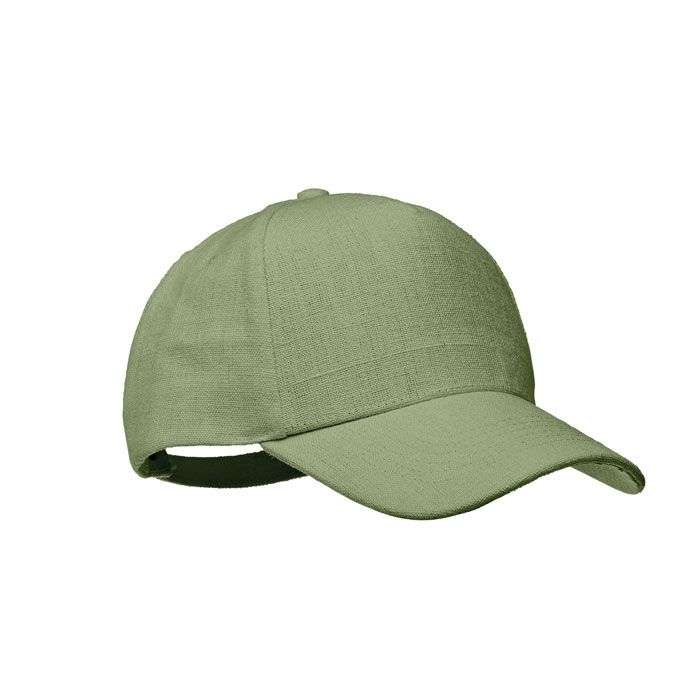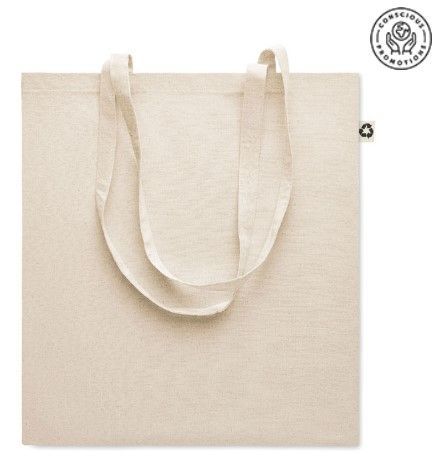Eco Promotional Products Material Guide: Hemp
5 July 2024
How Sustainable Is Hemp?

Hemp: The Responsible Choice
Hemp fabric has experienced a significant image makeover recently, as consumers and brands recognise its versatility, strength, and sustainability.
Hemp, the non-psychoactive cousin of marijuana, contains only trace amounts of cannabis's psychoactive component. This means the high you get from hemp fabric is a moral one, knowing you're wearing a more sustainable material. Despite its "boring" reputation, hemp's association with cannabis has tarnished its image over the years. Moreover, its historical link with grunge-style, baggy clothing hasn't helped its popularity.
However, hemp is redeeming its image, thanks to its undeniable potential. The environmental benefits of hemp cultivation, combined with its durable properties, allow it to be used in clothing and bags that are both stylish and comfortable.
What is Hemp?
Hemp has a long history as a fibre, used for thousands of years across the globe in clothing, ropes, and sails. The term “canvas” is believed to derive the same Latin route as that for “cannabis.” As a ‘bast’ fibre, hemp is derived from plant stems in a similar way to flax and jute. This fabric boasts natural advantages: it keeps you warm in winter, cool in summer, and provides UV protection.
Pure hemp fibre resembles linen in texture but can be blended with other plant-based fibres for additional softness and versatility. According to Textile Exchange, hemp fibres can be used to create a variety of fabrics, from jersey to denim to canvas.
Hemp's Sustainability
Hemp's nickname, "weed," reflects its rapid and dense growth, which outcompetes other plants and eliminates the need for herbicides. It also naturally reduces pests, minimizing pesticide use. Hemp replenishes the soil by returning 60-70% of the nutrients it takes and capturing carbon from the atmosphere.
Compared to cotton, hemp requires significantly less water—Textile Exchange notes that cotton uses about 50% more water per season than hemp. Including processing, cotton consumes over four times as much water as hemp. Additionally, hemp yields more fibre per hectare than cotton and can be integrated into crop rotations, enhancing soil health.
However, not all hemp is organic, and some farmers still use harmful fertilisers. It's essential to choose organic hemp and research brands thoroughly.
From Plant to Fabric
Hemp fabric is produced from the long fibres of the plant's stalk, separated through a process called "retting." These fibres are spun into thread and woven into fabric. While traditional methods from the early 1900s are being updated, modern production can involve environmentally intensive chemical processes. "Hemp viscose" often indicates harmful processing methods similar to regular viscose. Some companies use the less harmful Lyocell process, so it’s important to verify the production methods.
Transportation and dyeing also impact hemp's sustainability. Transporting bulky hemp to processing centres is energy-intensive, but localised supply chains can mitigate this. Dyeing techniques vary in their environmental impact.
Hemp and Promotional Products
Hemp fibre is highly durable so works well in products such as tote, drawstring or toiletry bags. The fibre takes dye really well and can be decorated by screen, transfer print or embroidery.


Hemp fibre is naturally UV resistant and breathable helping to reduce sweating for products such as baseball caps.
Conclusion
Hemp generally offers a more sustainable, lower-impact alternative for fabric production. Ensuring responsible manufacturing processes can further enhance its eco-friendliness, making hemp a compelling choice for sustainable promotional products
Share this blog:

How can you tell which items genuinely meet environmental and ethical standards? How do you know your promotional merchandise is eco? One of the best ways is by looking for trusted third-party certifications. These certifications offer transparency, set rigorous criteria, and help ensure that your branded merchandise aligns with your sustainability values. Here's a quick guide to five of the most respected certifications to look out for when choosing eco-conscious products. 1. FSC – Forest Stewardship Council What it means: The FSC certification ensures that wood, paper, and other forest-based materials come from responsibly managed forests that provide environmental, social, and economic benefits. Why it matters: If you're sourcing promotional items made from wood or paper—like notebooks, packaging, or wooden gifts—FSC certification guarantees that the materials are sustainably harvested. Look for: Products marked with the FSC logo; and check the certificate number on the FSC Certificate Search. Visit FSC official site 2. GOTS – Global Organic Textile Standard What it means: GOTS is a globally recognized certification for organic textiles. It ensures that fabrics like cotton are grown without harmful chemicals and processed in socially and environmentally responsible ways. Why it matters: Many promotional products, like tote bags, T-shirts, and towels, are textile-based. GOTS certification means these items are organic, safe, and ethically produced from farm to finish. Look for: A GOTS-certified label and supplier. You can verify through the GOTS Public Database. Visit GOTS official site What it means: Fairtrade certification supports better prices, decent working conditions, and fair terms of trade for farmers and workers in developing countries. Why it matters: Products like cotton bags, chocolate bars, or coffee mugs with Fairtrade-certified contents ensure ethical treatment of producers and sustainable farming practices. Look for: The blue and green Fairtrade logo on packaging or labels. Visit Fairtrade Foundation (UK) 4. OEKO-TEX® STANDARD 100 What it means: This certification verifies that textiles are tested for harmful substances and are safe for human use. Why it matters: Even "natural" fabrics can be treated with dyes or chemicals. OEKO-TEX® ensures that every component of the product—from threads to prints—is free from harmful levels of over 100 substances. Look for: The STANDARD 100 label and certification number for verification via the OEKO-TEX® Label Check. Visit OEKO-TEX® official site 5. Cradle to Cradle Certified® What it means: Cradle to Cradle certification assesses products for environmental and social performance across five categories: material health, circularity, clean air & climate protection, water & soil stewardship, and social fairness. Why it matters: This is especially valuable for innovative and multi-material products. It focuses on the entire lifecycle, not just sourcing or disposal. Look for: The Cradle to Cradle Certified® mark and specific level (Bronze, Silver, Gold, or Platinum). Visit Cradle to Cradle Products Innovation Institute Why Certifications Matter for Your Brand Choosing certified eco-friendly promotional products isn’t just about ticking a box—it shows your customers, staff, and stakeholders that you care about ethical sourcing, sustainable production, and long-term environmental impact. These certifications offer peace of mind and add real value to your brand story. At Pavilion Earth, we’re proud to work with suppliers who prioritise sustainability and transparency. Want help finding the right certified products for your campaign? Get in touch with us — we’d love to help.
Understanding Vector Files vs Raster Files for Eco Promotional Products When it comes to branding on eco promotional products, understanding the different file types is crucial. Whether you’re creating logos for reusable water bottles or designing training manuals, the choice between vector and raster files significantly impacts the quality, scalability, and versatility of your designs. In this blog, we’ll explore the characteristics of these two file types, their applications, and why choosing the right format matters for both print and digital media. --- What Are Vector Files? Vector files are a digital image format based on mathematical formulas that define shapes, lines, and colours. Unlike raster files, which are made up of pixels, vector files use points and paths, allowing them to remain resolution-independent and infinitely scalable. Common vector file formats include **.SVG** (Scalable Vector Graphics), **.AI** (Adobe Illustrator), and **.EPS** (Encapsulated PostScript). Advantages of Vector Files 1. Scalability: Vector files can be scaled up or down without any loss in quality. Whether you’re designing a logo for a promotional pen or a large conference banner, vector graphics remain crisp and clear. This scalability makes them ideal for **printing on eco promotional products**, signage, and manuals. 2. Editability: Vector files are highly editable. Designers can easily adjust individual elements like shapes, colours, and sizes without compromising image quality. This flexibility is particularly useful for **custom branding**, where logos or designs need modifications for various products. 3. Small File Sizes: Vector files are typically smaller than raster files because they store mathematical data rather than individual pixels. This makes them faster to load, ideal for web use, and easier to share across platforms. Applications of Vector Files Vector files are perfect for projects that require sharp, scalable designs. Their primary uses include: - **Eco promotional products**: Logos for reusable bottles, tote bags, and stationery. - **Print materials**: Brochures, business cards, and training manuals. - **Signage**: Pop-up banners and large-scale graphics. - **Web graphics**: Icons, infographics, and logos for websites. --- What Are Raster Files? Raster files, also called bitmap images, consist of individual pixels that make up the image. These files are resolution-dependent, meaning their quality is determined by the **pixels per inch (PPI)** or **dots per inch (DPI)**. Common raster file formats include **JPEG**, **PNG**, and **TIFF**. Advantages of Raster Files 1. Photorealistic Detail: Raster files excel at capturing detailed and complex images, such as photographs or digital paintings. This makes them ideal for **photographic designs** used in digital or print materials. 2. Image Effects: Raster files support various effects, such as shading, filters, and blurring. These capabilities allow designers to enhance photos or create artistic visuals for **social media posts, eBooks**, or website banners. Applications of Raster Files Raster files are better suited for detailed, photorealistic designs. Their primary uses include: - **eBooks and digital materials**: Low-resolution images for screens. - **Web graphics**: Social media posts and website banners. - **Photography**: Printing high-resolution photos for promotional use. - **Complex artwork**: Digital illustrations or detailed graphics. --- Vector vs Raster Files: Key Differences 1. Scalability - **Vector Files:** Infinitely scalable without loss of quality, ideal for logos and large-format printing. - **Raster Files:** Lose quality and become pixelated when enlarged. 2. Editability - **Vector Files:** Easy to edit individual elements (shapes, colours, etc.), making them versatile for product branding. - **Raster Files:** Difficult to edit without compromising quality. 3. Resolution Dependence - **Vector Files:** Resolution-independent; sharp at any size. - **Raster Files:** Resolution-dependent; quality depends on the original PPI or DPI. 4. File Size - **Vector Files:** Smaller file sizes, suitable for web use and quick loading. - **Raster Files:** Larger file sizes due to pixel data. --- Why File Choice Matters for Eco Promotional Products When creating branded materials for eco promotional products, the right file type ensures your designs are visually appealing and consistent across all platforms. Here’s why: - **For Print:** Vector files are essential. Logos and graphics need to be sharp and scalable for different product sizes, from mugs to banners. Vector files also work best for high-resolution branding on training manuals or reusable promotional items. - **For Digital:** Raster files are better suited for low-resolution displays, such as eBooks, social media posts, and websites. However, remember that even digital logos and icons can benefit from vector files for faster loading and a crisper appearance. --- Partnering with Pavilion Earth for Your Eco Promotional Needs At Pavilion Earth, we understand the importance of getting your branding right, whether it’s for a biodegradable tote bag, a stainless steel water bottle, or digital training materials. Choosing the right file format is just one step in ensuring your promotional products reflect your values and your brand’s quality. Our team can guide you through the process of selecting and preparing the correct file types for your eco promotional products. Need help deciding between vector and raster files? Let us assist you in optimising your designs for maximum impact. Contact Pavilion Earth today to discuss your promotional product needs and branding goals. Together, we’ll make sure your materials stand out while staying eco-conscious.



